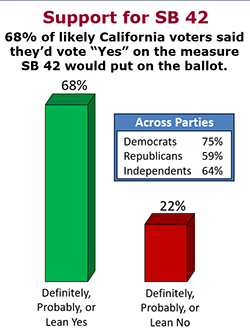Our View: Keep donors' names public
A bill that would make it clear who the major donors to political ads really are is making its way through the California Assembly. But it faces a lot of roadblocks in committees made up of politicians who think they might suffer if they would allow voters to know which major donors are behind political ads in state and local elections. A.B.1148, the California DISCLOSE Act, is sponsored by Los Angeles Assemblywoman Julia Brownley. It would require that the three largest donors to any political ad include their names in large type and display their logos on all political ads - wherever they occur, even on TV. Currently, big donors tend to be grouped into vague organizations with deliberately oblique or deceptive names, such as "California Jobs Initiative," which give voters no information about the real identities of those who pay for the ads. The need for this bill stems from a U.S. Supreme Court ruling two years ago in Citizens United vs. Federal Election Commission case. The high court found that there could be no limits on spending for political campaigns by corporations and unions. That opened the floodgates for large donations such as those that super PACs are using in the presidential campaigns. Misleading political ads are a huge problem in California. In 2010, more than $235 million was spent on state ballot measure advertisements. Most of the ads were paid for by groups with mysterious origins and innocuous-sounding names, according to the California Clean Money Campaign, which is the force behind this bill. We're not going to get money out of elections. The only solution is to make campaigns more transparent. When voters are clear about who is paying for which candidates and initiatives, they can make more informed decisions at the ballot box. In one example from 2005, a measure to create a state prescription drug-discount program was defeated thanks in large part to $123million from three of the largest drug companies, which were never identified. Instead, the donors were identified with the umbrella organization, Californians Against the Wrong Prescription. If A.B.1148 can make its way through the Appropriations Committee, it still would face an uphill battle in both the Assembly and the Senate. These lawmakers are the folks who benefit the most from political ads on their behalf. It would need a two-thirds majority to put the measure on the ballot, where, chances are good, it would win overwhelmingly. California needs A.B.1148. Lawmakers have expressed concern about the cost of putting the measure on the ballot if it passes in the Legislature and haven't said whether they support the bill. For the sake of voters, they should. See the article on Pasadena Star-News website (In accordance with Title 17 U.S.C. Section 107, this material is distributed without profit to those who have expressed a prior interest in receiving the included information for research and educational purposes.) |




